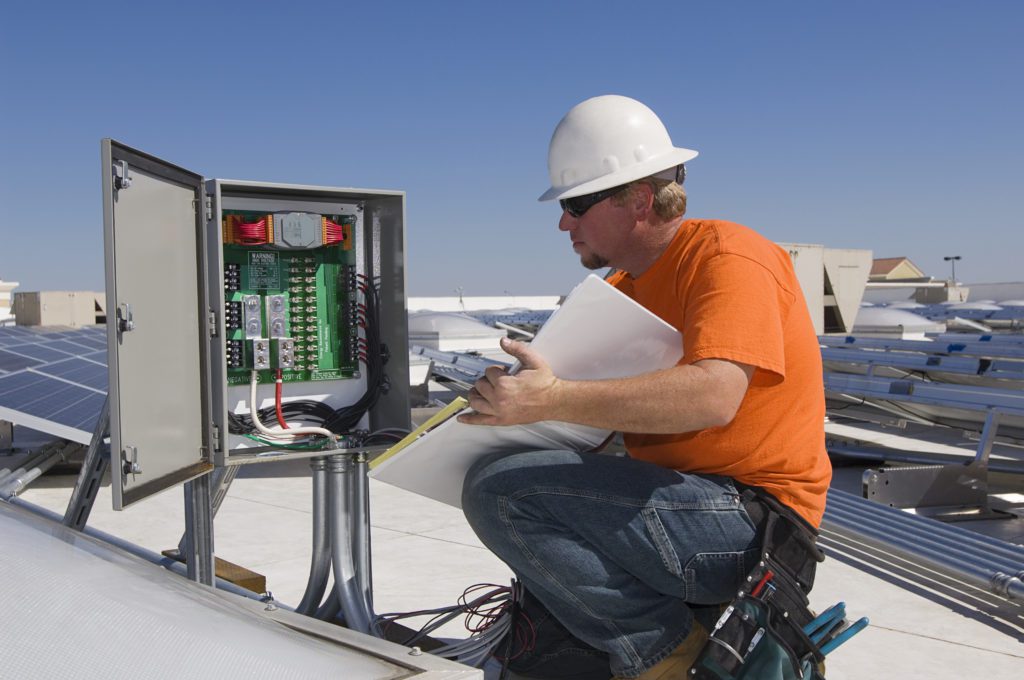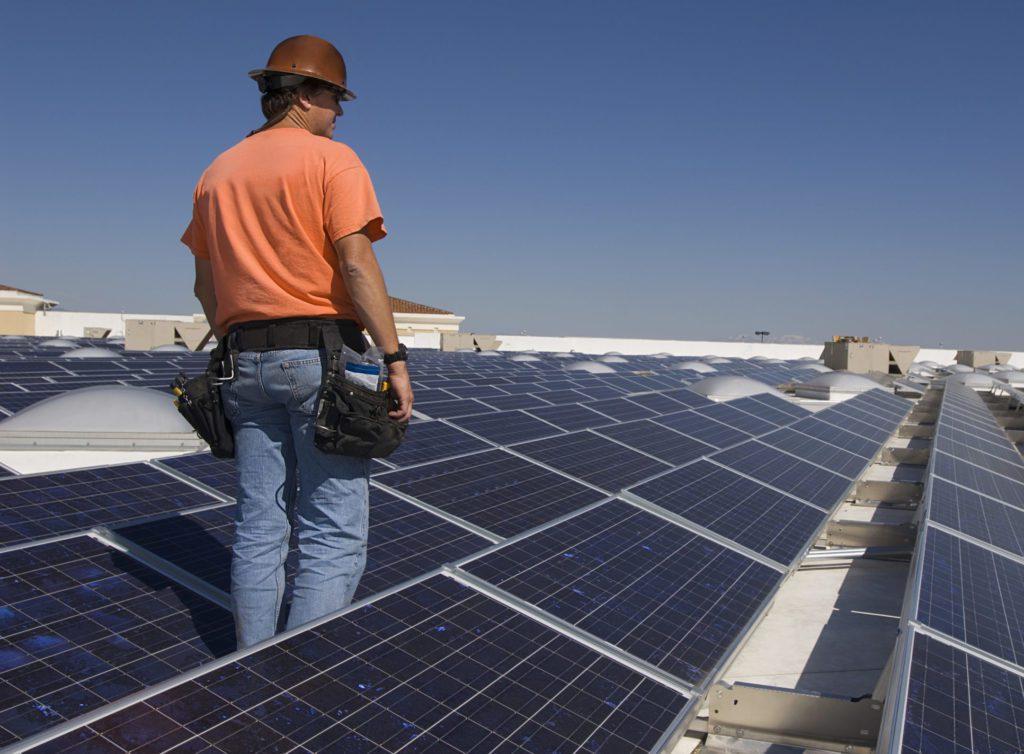
The top online schools for Solar Energy have many flexible and affordable programs to start your career in Sustainable Solar Energy. You may be interested in a career in solar energy because the jobs pay well. However, a renewable energy career is not just a good job.
The benefits to the environment and society give you reasons to feel good about a solar career. For example, solar energy development secures a sustainable energy resource and fights climate change. Furthermore, it saves other resources like water. In addition, by phasing out traditional energy sources, solar energy can improve human health and national defense.
The employment of solar photovoltaic (PV) installers is growing faster than the average for all occupations. As the solar industry continues to grow, the need for solar and PV systems technicians will also continue to grow. In addition, the job opportunities for those who complete training courses on solar panel installation at a community college or technical school will be abundant. After gaining experience and earning a credential, you can move to an associate’s or bachelor’s degree in sustainable energy.
How We Ranked The Best Online Programs for Solar Energy Technicians.
The OnlineSchoolsGuide editors found schools offering online or hybrid classes or certificates in solar energy. The list was not very long, and all the online solar programs we found made the list. Although there are not many online options for solar energy certificates, we expect this to change soon. So, check back soon for updates on new online solar programs!
| Top 10 Online Schools and Programs for Solar Energy Technicians |
|---|
| 1. NC Clean Energy Technology Center at NCSU |
| 2. Century College |
| 3. Colby Community College |
| 4. Central New Mexico Community College |
| 5. Hudson Valley Community College |
| 6. Bryan University |
| 7. Solar Energy International |
| 8. Midwest Renewable Energy Association (MREA) |
| 9. Solairgen School of Solar Technology |
| 10. HeatSpring |
1. NC Clean Energy Technology Center at NCSU
| Online Offerings: Fundamentals of Photovoltaic Design and Installation |

The NC Clean Energy Technology Center at North Carolina State University offers Online Programs for Solar Energy Technicians. The award-winning NC Clean Energy Technology Center has a diploma series in Renewable Energy Technologies. The online Renewable Energy Fundamentals of Photovoltaic Design and Installation program comprises 40-credit hours completed in 6 weeks. The classes include workshops that teach students the practical application of photovoltaic systems, renewable energy management, solar thermal design, and more. The online course consists of weekly pre-recorded lectures and weekly readings and quizzes.
After completing the online class, students are eligible to sit for the NABCEP PV Associate Exam. The North American Board of Certified Energy Practitioners is the most widely recognized national certification organization for professionals in renewable energy. NABCEP offers credentials for skilled professionals in solar technologies. The Clean Energy Center recommends students also take an on-site one-day PV installation class that is a companion to the online course. The hands-on companion workshop meets at the end of the online REPV course at the NC Clean Energy Technology Center training annex in Raleigh, NC.
2. Century College
| Online Offerings: Solar Assessor Certificate (hybrid), Advanced Photovoltaic Energy Systems Certificate, Solar Sales and Marketing Certificate, Energy Technical Specialist AAS Degree |

Century College is a small school in White Bear Lake, Minnesota. It offers some of the best online programs for Solar Energy Technicians. Students can complete the Century College Solar Assessor Certificate entirely online with sixteen credits. In addition, Century offers the Energy Technical Specialist Associate of Science degree and two other solar certifications. Graduates of the Century College solar programs are prepared for jobs as solar assessors, solar installers, solar technicians, and installation supervisors.
Century College is one of the largest two-year colleges in Minnesota, with over 20,000 students enrolled every year. The school is accredited by the Higher Learning Commission (HLC).
3. Colby Community College
| Online Offerings: Solar Photovoltaic Technical Certificate |

Colby Community College offers a Solar Photovoltaic Certificate of Completion online and an in-person Solar PV Technical Certificate. In addition, the college recommends that students participate in boot camps in both the online and on-campus programs for Solar Energy Technicians. Saturday “boot camps” are offered every eight weeks in the fall and spring semesters. They provide hands-on training with state-of-the-art equipment.
Colby Community College is located in the High Plains of Kansas. It is in the state’s northwest corner and only about fifty miles from the Colorado and Nebraska borders. Colby Community College is accredited by the Higher Learning Commission.
4. Central New Mexico Community College
| Online Offerings: Solar Electric Basics |

Solar development in New Mexico is growing at a rapid rate. The state expects the demand for trained solar technicians and electricians to double in the next few years.
Central New Mexico (CNM) Community College offers the Solar Electric Basics online course. The short program includes live classes and asynchronous content about solar energy fundamentals. The Solar Electric Basics class is offered in the spring and fall and delivered through CNM Ingenuity. Also, CNM Community College students can enroll in a sixty-hour prep course for the North American Board of Certified Energy Practitioners® (NABCEP®)Solar Associate credential.
Central New Mexico (CNM.) Community College, in conjunction with CNM Ingenuity, is working to build a more skilled workforce. CNM Ingenuity, Inc. is a non-profit created in 2014 by Central New Mexico Community College. They provide innovative training and development in crucial workforce areas like the Solar or Photovoltaic Academy.
5. Hudson Valley Community College
| Online Offerings: PV-Associate (Solar Power) Online |

The New York State Energy Research and Development Authority (NYSERDA) worked with Hudson Valley Community College to develop a solar energy training program in response to the increased need for qualified solar PV installers. The Hudson Valley Community College campus is in Troy, New York, and is part of the State University of New York College system.
The Hudson Valley Community College online program for Solar Energy trains students to enter the solar panel installation and maintenance field. The community college offers a 21-credit Photovoltaic Installation online Certificate for students interested in renewable energy. The program covers photovoltaic (PV) systems design and installation fundamentals. After completing the class, students are prepared to sit for the North American Board of Certified Energy Practitioners (NABCEP) PV Associate Exam. In addition, Hudson Valley Community College PV Students can take the exam through the school.
6. Bryan University
| Online Offerings: Solar Energy Technician Certificate |

The Bryan University Solar Energy Technician online certificate program provides educational opportunities for students to enter the photovoltaic and renewable energy fields. In addition, the 40-week diploma program prepares students for employment in solar installation, sales, and operations. Bryant is a North American Board of Certified Energy Practitioners (NABCEP) Registered Provider. In addition, the program prepares students for the NABCEP Photovoltaic Associate certification.
Bryant University has been providing career training programs to students since 1982. Bryant is accredited by the Accrediting Council for Independent Colleges and Schools (ACICS). Additionally, the Springfield, Missouri campus is approved to offer fully online programs.
7. Solar Energy International
| Online Offerings: Fundamentals of Photovoltaic Design and Installation |

Solar Energy International (SEI) is a non-profit educational organization. SEI provides technical training in renewable energy. In addition, Solar Energy International offers online courses in solar.
SEI has been an education provider for renewable energy education for over 25 years. The school offers an online solar training program and in-person workshops to students worldwide. The SEI Online Campus provides access to a world-class curriculum and highly trained instructors. Online courses are taught by instructors actively working in the solar industry. These experts also teach the same instructors the in-person classes.
Students may take individual classes or choose to pursue the solar professional certificate program. The certificate consists of nine required courses and a training progression. Each class lasts six weeks. SEI also hosts four-day labs at its Paonia, Colorado campus.
8. Midwest Renewable Energy Association
| Online Offerings: Solar Photovoltaic Technical Certificate |

The Midwest Renewable Energy Association (MREA) offers online training for Solar Photovoltaics (PV) Technicians. MREA professional training courses are available either online or in person. The Basic PV class (PV 101) teaches solar electric systems basics. The Solar Photovoltaics Site Assessment Training (PV 201) covers performing a PV site assessment. And Solar PV System Design (PV 202) instructs students about equipment, layout, and design considerations.
MREA courses meet the North American Board of Certified Energy Practitioners (NABCEP) educational requirements for credentialing. They are also accredited by the Interstate Renewable Energy Council (IREC).
9. Solairgen School of Solar Technology
| Online Offerings: Entry-Level Solar Installer Training Online |

The Solairgen School of Solar Technology offers online programs in Solar Energy. Students can take the entry-level solar design and solar installation class entirely online. The PV201 class is a prerequisite for other more advanced classes. It covers beginner and intermediate solar topics in one class. After completing PV201, you can register for the Associate Installer Certification Exam.
Solairgen is an IREC Accredited and a NABCEP-approved training organization. They have been in the solar panel installation training business since 2007. Solairgen is also a registered provider of the NABCEP Associate Credential Certification Exam.
10. HeatSpring
| Online Offerings: Solar Photovoltaic Bootcamp |

HeatSpring offers the Solar PV Bootcamp + NABCEP PV Associate Exam Prep online program for Solar Energy Technicians. The self-paced online solar course. The class fulfills the training requirements for the NABCEP PV Associate Exam. After signing up, students immediately access the online lectures and course materials. You can work at your own pace through the six modules. If there is anything you don’t understand, live instructors are available for questions.
HeatSpring is a learning platform that provides online training in the solar and cleantech industries. They began at Babson College in 2006, and today, there are over 200 courses available on the platform. HeatSpring is a North American Board of Certified Energy Practitioners (NABCEP) Registered Provider and a NABCEP PV Associate Exam provider.

What Does A Solar Energy Technician Do?
Solar photovoltaic (PV) technologies, or solar panels, convert solar energy into energy by directly absorbing solar light particles. Solar Photovoltaic (PV) technicians install solar energy systems and maintain solar panel systems. Projects may range from solar power for educational institutions to installing a small residential solar panel system.
This physical job requires technicians to climb and be on their feet most of the workday. The solar installer’s job description includes handling heights and working on rooftops or other structures. Solar panel installation often requires working as part of a team, and service and maintenance jobs are often solo.
Therefore, Solar Technicians should be comfortable working individually and in groups. And they must have a good understanding of how a solar system and solar panels work. Furthermore, the best solar company university place, solar company for schools, and online accounting solar contractors can advance your solar PV installer career.
What Kind of Education do You Need to Install Solar Panels?
Solar Technicians are generally required to have a high school diploma. However, most solar companies offer on-the-job solar photovoltaic installers training. So, workers learn to install solar panels, including safety and solar PV basics. In addition, technicians who have related electrical, roofing, or construction experience may have expanded job opportunities. For example, many companies need a high voltage electrician who also understands solar systems.
Solar technicians should also have excellent soft skills. To become a solar photovoltaic installer, they should be able to communicate and interact effectively with co-workers, supervisors, and customers.
A solar panel installer certification is not always required to work in the solar industry. However, a solar PV installer certification can move your career faster. There are many solar photovoltaic installation certification classes offered in person and some provided online.
How Do You Become a Solar Energy Technician?
An online certificate program for Solar Energy Technicians will help you get launched in the solar energy field. After some work experience, you can earn more credentials and an associate degree or a bachelor’s degree in Sustainable Energy. Earning a solar photovoltaic installer certification is the first step to a career in solar!
How Long Does it Take to Become a Solar Photovoltaic Installer Technician?
Solar PV Installers usually receive on-the-job training. The amount of time it takes to become competent in the field will vary. However, the typical on-the-job training will last up to a year.
Technicians who earn solar credentials can speed up the training process. A solar PV entry-level class or certification will cover most of the knowledge component of the training. Earning a certificate will make the field component of education make more sense. And you will become a qualified Solar Photovoltaic Installer Technician faster.
What Certification Do You Need To Be A Solar Installer?
The North American Board of Certified Energy Practitioners certification program is the gold standard for photovoltaic (PV) solar installers. NABCEP is a well-established and widely recognized certification organization for North American solar professionals in renewable energy.
For entry-level solar installation classes and certificates, you should look for a program that prepares you for the NABCEP Solar PV Entry Level Exam.
How Are Solar Energy Programs Accredited?
Like any other educational program, solar tech students should make sure the schools they choose to attend have received accreditation. Check to ensure the institution is accredited if you are attending a solar energy program through a traditional school like a community college or university. This information is on the school’s website. Other solar photovoltaic installers’ schools may be independently run but accredited by a solar organization.
The Interstate Renewable Energy Council (IREC) is the organization to look for that accredited the school’s solar program. The IREC has been providing training accreditation for clean energy programs for over thirty years.
How Are Solar Energy Installers Licensed?
Becoming a solar energy professional may require a state license specific to solar. If you want to become a solar installer contractor, the installation licensing regulations differ from state to state. However, many state licensing agencies require some level of NABCEP credential for a solar installer’s license. Your state energy regulatory department website should list the official licensing requirements.
In addition, there is a Solar Licensing Database on the Interstate Renewable Energy Council (IREC) website that summarizes each state’s requirements. This site is a good starting point for determining your state’s requirements. However, make sure you use your state’s information as the definitive source. It will be the most up-to-date source. In addition, some states have reciprocity with each other. If you work in two or more states, check if you qualify for a reciprocity program.
How Much Is The Salary For a Solar PV Installer Technician?
The BLS median annual wage for solar photovoltaic installers was $47,670 in May 2021. The solar panel technician’s salary range was $36,320 to $72,080 and varied by location, experience, education, and other skills. Solar energy PV installer technicians with more education and experience can earn a higher salary. Furthermore, a solar photovoltaic installer job in a high-demand state can earn a higher salary than the national average.
What Is The Job And Career Outlook For A Solar Energy PV Technician?
The Bureau of Labor Statistics (BLS) estimates the employment of solar photovoltaic (PV) installers and technicians to grow 27% from 2021 to 2031. The rapid growth makes Solar PV installers one of the top-growing occupations across the country. The BLS attributes this expansion to the increased popularity of solar energy.
The number of solar jobs available is also related to the cost of solar installations. In recent years, improved manufacturing and government incentives have made solar more affordable. As a result, more homeowners and businesses can afford to switch to solar power. So, the drop in cost has also increased the demand for solar technicians.
You can find the BLS comprehensive report on Careers in Solar Power online. It has an abundance of information on the entire solar power industry. The growth in this sector will create solar jobs. In addition, it will create secondary employment in related areas like manufacturing, administration, and engineering.
Related:
